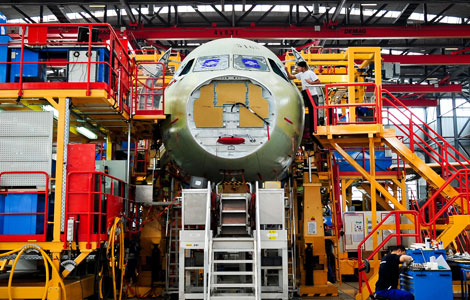Big challenges lie ahead for urban planners
Updated: 2013-10-23 00:26
By Meng Jing and Zheng Yangpeng (China Daily)
|
||||||||
What is the biggest hurdle for a technological revolution on the scale of the smart city movement in China?
It's certainly not a lack of interest. Just as the country's construction boom has been a magnetic draw for world-class architects, the nascent smart city market has also attracted people who are not afraid to think big.
George Thomas, general manager of the smart city program for IBM Greater China, has been leading a team implementing smart city solutions in China in recent years.
Peter Lacy, managing director of Accenture Sustaining Services Asia Pacific, moved to Shanghai 20 months ago. He said that although places such as London, New York, Singapore and Amsterdam are important gateways for the company's smart city business, "China is the No 1 priority in the world for us".
According to CCID Consulting, China's market for smart city solutions increased 15.2 percent year-on-year to 137.7 billion yuan ($22.57 billion) in 2012. It's expected to jump to 500 billion yuan in 2015.
Wu Lun, a professor at Peking University and deputy dean of the university's Institute of Digital China, said that the market could even exceed 1 trillion yuan by 2015 if spending on infrastructure, data-processing facilities and service platforms is included.
But Chinese engineers still fear that potential clients, mostly urban governments, may not be so committed financially.
In early October, the first national smart city industry association was founded in Beijing, with more than 100 members ranging from IT companies and equipment makers to consulting firms.
Many member companies of the China Smart Cities Industry Alliance said they are not afraid of competition from international companies, because they have some very advanced solutions on offer.
What they worry about is funding. "Lots of people talk the talk, but walking the walk is what really matters," said an IT engineer who has been engaged in providing solutions for integrated online retirement services.
By contrast, for large or international players, money doesn't seem to be an issue.
One example: China Development Bank, which is commissioned to assist the government's development programs, announced plans to use at least 80 billion yuan to finance smart city programs by 2015. But industry insiders said that they believe the actual amount will be much larger.
More than 95 percent of vice-provincial level cities and 76 percent of prefecture-level cities have submitted proposals to build smart cities, said Peng Sen, deputy director of the Financial and Economic Affairs Committee of the National People's Congress, the country's top legislature.
Projects ranging from the smart electricity grid to transportation systems, water infrastructure, medical care and environmental protection will be built under the umbrella of smart cities, he said.
"But China's smart city program is a bit different from the West, where the emphasis is on the application of information technology in urban infrastructure," Peng said.
"Our program puts more emphasis on promoting ‘human-centric' urbanization and pushing the evolution of city governments' roles."
Analysts said the smart city program will be a major boost for software, integrated circuit and e-commerce companies. Related services also are expected to pull up the whole service industry and overall economy.
China has set a target to boost public and household spending on the IT industry by more than 20 percent annually through 2015 and foster a 3.2 trillion yuan industry by then, according to a State Council meeting in July.
The council, which is China's cabinet, designated the information sector as the new driver for the country's economic growth. Documents issued this year specifically encouraged more organizations to get involved in smart city development.
Lacy has observed a "huge amount of interest.
"But I would say from my experience of traveling around China, talking to mayors and city officials, that the strategy (of building smart cities) is much more ambitious and the vision is much larger than the execution and the action really taking place."
So the real challenge, instead of money, is the "big gap between rhetoric and reality", he said.
But with money and government commitment, chances are good for companies to be involved in some monumental projects.
Thomas declined to reveal the scope of the company's smart business in China, but he said the business potential is probably the largest in the world.
"China has about 90 cities with more than 1 million people. We are going to have more than 200 cities with more than 1 million people in 2030."
Lacy added that it is easier for developed economies to implement projects, but they tend to be smaller.
So the opportunity is really in China, "not just domestically but internationally", he said. Just as the United States defined the last era of urbanization, China has the opportunity to leap ahead, redefining urbanization for a new era.
However, as with every aspect of development in China, industry experts fear that with so many cities and companies involved, the smart city market may become chaotic, and standards will be hard to reinforce.
For example, different authorities have chosen different cities in which to run smart city pilot programs and related projects. Each city also has its own priorities.
Challenges ahead
Tong Tengfei, deputy director of Beijing's commission of economy and information technology, said his department has been leading the smart city programs in population monitoring, traffic control, environmental protection and public security in the capital city.
All of Beijing's taxis and about 65 percent of the city's buses are equipped with global positioning systems to help the municipal administrators monitor and direct real-time traffic flow.
But can the same solution be used in other cities — or among many cities?
Xiong Gaizhi, secretary-general of the China Smart Cities Industry Alliance, said there's a lack of standards and benchmarks for project evaluation.
"There is a rush in which so many cities jump on the ‘smart city' bandwagon," Xiong said.
"But it is difficult to judge whether the projects they have taken up are really sophisticated enough to do the job and live up to the name of smart city solutions."
Yin Zheng, senior vice-president of Schneider Electric in China, said that project planning also is a serious challenge.
"Smart city solutions are not as simple as having some IT. They are solutions that integrate many economic and social factors to ensure sustainable growth for cities and improve the living standards of urban residents," Yin said.
IT companies need to think about the best way to work with governments and investors and how to set an appropriate price for the industry and for customers.
Li Tie, the head of the China Center for Urban Development, said the smart city programs should make better use of resources and increase the convenience of daily life.
He noted that while the country's cities have surged ahead in their development, urban life has actually become more difficult.
"Rome wasn't built in a day, but often, our cities look as though they've changed overnight. How can you expect them to be ‘sustainable' given such a rapid pace?" Li asked.

 Beijing Opera troupe perform in Brazil
Beijing Opera troupe perform in Brazil
 Nature's masterpieces
Nature's masterpieces
 Riot police off to Libya peacekeeping mission
Riot police off to Libya peacekeeping mission Teacher killed, two wounded in Nevada middle school shooting
Teacher killed, two wounded in Nevada middle school shooting
 Smog wraps northeast, schools forced to close
Smog wraps northeast, schools forced to close
 Architect looks to the big picture
Architect looks to the big picture
 Teachers, students divided over Gaokao reform plan
Teachers, students divided over Gaokao reform plan
 Dogfight looms over jets
Dogfight looms over jets
Most Viewed
Editor's Picks

|

|

|

|

|

|
Today's Top News
China, Russia reach new consensuses
Apple expected to unveil new iPads
US helps UN destroy Syria's chemical weapons
CNOOC, CNPC win Brazil oilfield bid
'Historic' sorghum shipment to China
Building a bridge of hearts in the heartland of the US
China issues white paper on Tibet's development
Hollywood must think bigger about China
US Weekly

|

|





